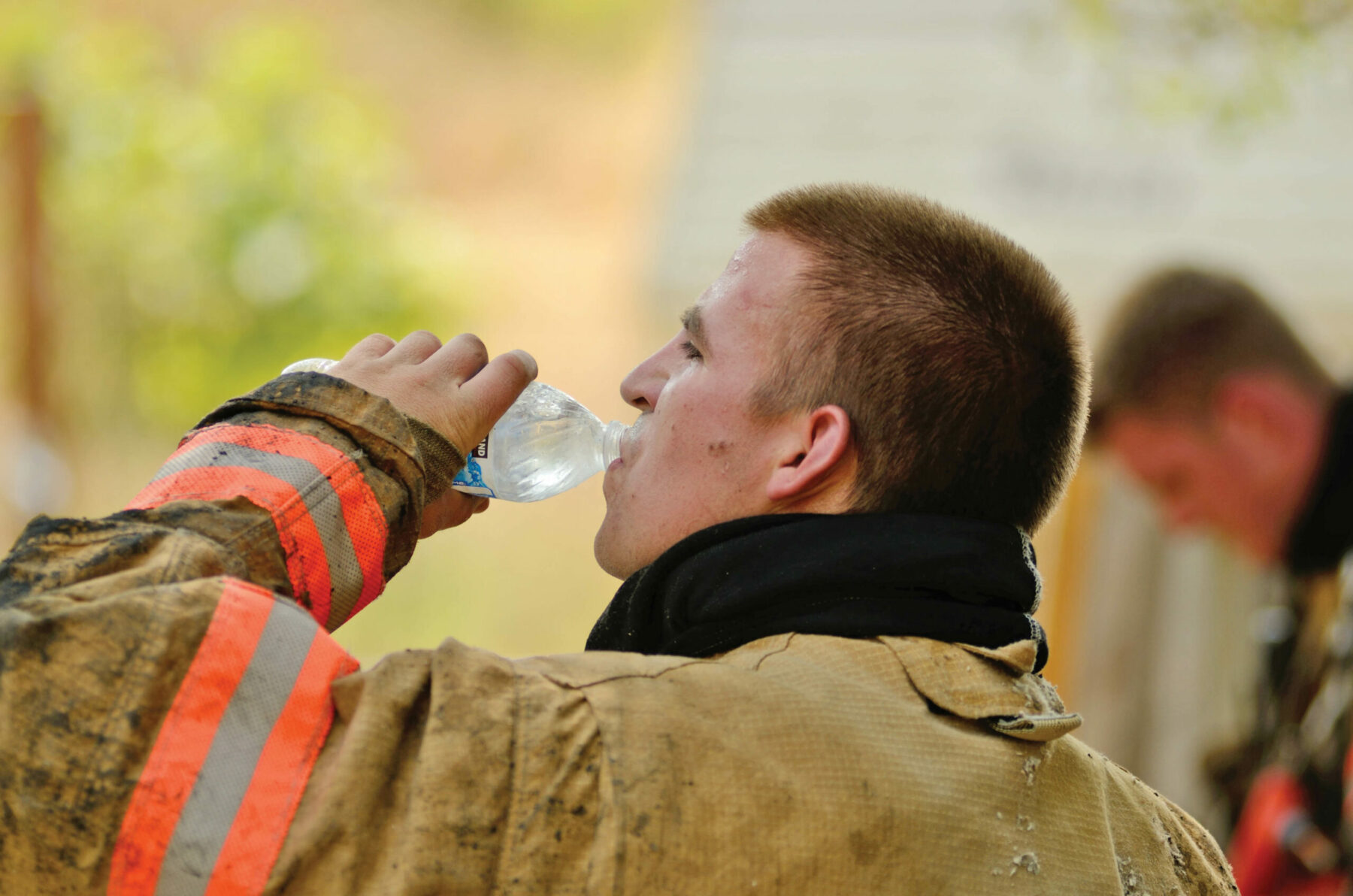Hydration Tips From a First Responders Expert

Being a firefighter can be an extremely stressful job. Our brave first responders need to be able to perform at their peak under very physically demanding circumstances. Therefore, a key performance indicator is hydration level.
As an exercise physiologist with the Austin Fire Department, I spend a lot of time training first responders, so I know a thing or two about how to stay hydrated, even in some of the hottest conditions.
Hydration is critical for both muscle and organ function, and recent studies show that cognitive performance can be diminished even with just a body water loss of 1 to 2%. Additionally, other research and literature suggest that an excess loss of 5% of one’s body weight can decrease someone’s work capacity by approximately 30%.
What happens when you get dehydrated?
It is important to understand that dehydration occurs in the body at the cellular level. The main elements of hydration, water and electrolytes can be found in three places in the body: inside cells, outside cells and within the bloodstream. The body naturally creates a fluid balance between all three locations through homeostasis, and when all three have equal concentration levels, the body is hydrated. When these concentration levels become unequal, dehydration occurs.
An example of this is if you go on a long run when it’s hot outside so you sweat a ton. You chug 2 to 3 liters of water to try to replenish your fluids, but the problem is when you sweat, you lose water and electrolytes. By replenishing with just water, you only increased the level of water in the body but not electrolytes.
This is actually a very common example of dehydration. It can be frustrating when you experience signs of dehydration even though you’ve been diligent about consuming water. Don’t forget, hydration is about both water AND electrolyte levels in the body.

Real quick, let’s talk about electrolytes. Electrolytes are ions (molecules with a charge), and the major ones are sodium, potassium, chloride, magnesium, calcium, phosphate and bicarbonate. Because ions have a charge, they attract water. Remember that where electrolytes go, water follows. This is why it is important to have an adequate amount of electrolytes in your system.
The key to staying hydrated is to ensure that you are consuming adequate amounts of water and electrolytes before, during and after physical activity, not just when you’ve been sweating or exercising for a while. Make sure you are consuming enough salt in your diet on a regular basis. The elements that make up table salt are sodium and chloride, which are two of the most important electrolytes.
If you feel like you haven’t been consuming enough electrolytes through your diet, you can supplement with things like electrolyte tablets or packs as well as sports drinks. The glucose (sugar) in sports drinks helps the body absorb the electrolytes, but you have to be careful because the sugar content can be fairly high. Unless you are doing rigorous physical activity, you probably don’t need all the sugar that comes with these drinks.
How do coffee and alcohol affect hydration?
These chemicals are diuretics, which means they block the release of antidiuretic hormone (ADH) in the hypothalamus in the brain. ADH controls the fluid balance in the body by signaling to the kidneys when it is time to use the bathroom. When ADH is blocked, the body basically loses control and you have to use the bathroom quickly and frequently. Coffee and alcohol affect hydration because frequently using the bathroom can flush out your electrolytes. So while those chemicals do play a role in dehydration, you can mitigate the risk of dehydration by consuming extra water and electrolytes alongside caffeine/alcohol consumption. Also, if you work a physically demanding job like our first responders or are exercising frequently, it might be smart to limit the amount of alcohol or caffeine you are ingesting, especially before physical activity.
Overall, staying hydrated is critical to the performance of firefighters, but it is also important to anyone who wants to live a healthy, active life. By ensuring that you’re consuming enough water and electrolytes, you can consistently perform at your job, in workouts or just in everyday life.
About the Author

Austin Womack, MS, TSAC-F, is an exercise physiologist with the Austin Fire Department and an active soldier in the US Army Texas National Guard. His coaching career started in 2013 and has taken him all over the country including two seasons in professional baseball with the Kansas City Royals. Before coming to Texas, Austin also spent some time out on the west coast fighting wildfires. Now, he uses his experience and training to help our local first responders live healthier, more fit lives.






